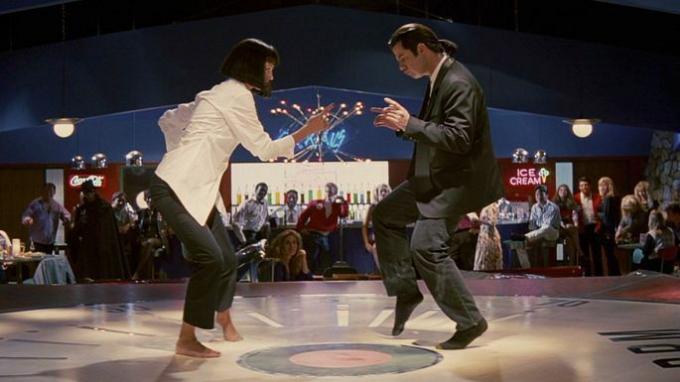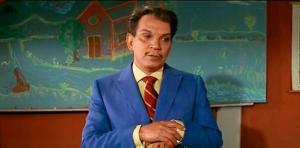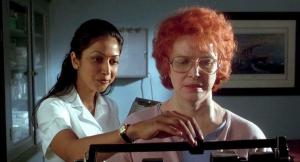Quentin Tarantino Pulp Fiction movie: summary, analysis and meaning
Pulp fiction, known in Latin America as Violent times, is a film directed by Quentin Tarantino, released in 1994. Since then, it has become a cult film and has made a mark in the history of cinema in the late 20th century.
The synopsis is based on the following plot: Vincent and Jules work for Marsellus Wallace, a gangster who controls the city's dark businesses, including gambling. The two thugs have different missions to accomplish for Marsellus. The main one is to recover a mysterious briefcase. Throughout his tasks, his destiny is intertwined with the most diverse characters.
Resume
Warning: contains spoilers.
The movie Pulp fiction bets on a singular narrative structure, consisting of a prologue, three episodes and an epilogue. This structure does not follow the chronological order of events but uses time jumps and narrative ellipsis.
Introduction

Pulp fiction is situated in Los Angeles. A couple argue in a coffee shop about their plans for the future. Little by little the dialogue reveals that they are two criminals planning their next move. Under persuasive argumentation, the man convinces the woman to immediately start an assault on the cafeteria.
At the same time, Vincent and Jules, elegantly dressed, talk in their car about the most banal topics and about Vincent's new mission: entertaining gangster wife Marsellus Wallace during his absence. The two men go to retrieve a briefcase that belongs to Wallace, and that is in the possession of the young Brett, Roger and Marvin. Upon arriving at the apartment, Jules invokes a biblical passage (Ezekiel 25, 17), and immediately afterwards, Brett and Roger are murdered.
Episode "Vincent Vega and Marsellus Wallace's Wife"

Butch is a boxer about to retire. In a night-club, Wallace bribes him to let himself be defeated in his last fight. There are also Vincent and Jules who have brought the briefcase back, but are strangely dressed in beach clothes. Before retiring, Butch has a little disagreement with Vincent.
Later, and shortly after buying heroin from Lance, Vincent shows up at the Wallace's house to tend to Mia. Fearing retaliation, Vincent avoids falling for the woman's seduction, without realizing the real problem: under her care, Mía becomes intoxicated with an overdose. Vincent must go to Lance's house to save her. After a shot of adrenaline, Mia revives and Vincent returns her to her house.
Meanwhile, just before his last fight, Butch has a dream. In this he remembers the moment when he received a watch, an old family jewel, sent by his father before he died in the Vietnam War.
Episode "The Golden Watch"
Butch wins the fight and runs away with the gambling money, which puts him on Wallace's target. The boxer hides in a motel with his wife, Fabianne. Noticing that his father's watch has been left in the apartment, Butch returns and finds Vincent and kills him with his own machine gun.
While fleeing in his vehicle, the boxer meets Wallace crossing the crosswalk. When he is run over, he loses control of the car. Wallace chases him to a nearby store, but the owner, Maynard, is armed. He ties them up while he waits for policeman Zed. The purpose of both is to sodomize the prisoners, starting with Wallace.
Butch manages to escape and interrupt the gangster's rape. In return, he spares his life on the condition that he never returns. The boxer flees with his wife.
Episode "The situation with Bonnie"

A timeskip takes us back to the scene in the apartment, where the spectator and Wallace's goons learn that there was one more young man in hiding. He inadvertently comes out and unloads his gun at them, without hitting a bullet. Jules perceives the presence of God in that coincidence that has saved him.
The criminals kill the young man but take away Marvin, Jules's old friend, briefcase in hand, while they discuss miracles. Asking Marvin for his opinion, Vincent mistakenly pulls the trigger and destroys the young man's brains. Faced with the scandalous blood that bathes everything, they are forced to ask for the help of Jimmy, a friend from that neighborhood.
Annoyed, Jimmy demands that they remove that problem from the house. Through Wallace, Mr. Lobo, an expert in problem solving, comes to his aid. Under his instructions, they wash the car, take a bath, and swap their fancy clothes for Jimmy's beachwear.
Final
The mess resolved and before returning the briefcase, Jules and Vincent stop at a cafe. While Vincent goes to the bathroom, Pumpkin and Yolanda (Honey Bunny) initiate the assault. Jules, who has decided to change his life, takes control of the situation using the mysterious briefcase as bait, He offers an alternative to the pair of assailants and, without giving them the briefcase, I give them a revealing speech and forgive them the lifetime.
It may interest you: Best movies on Netflix.
Analysis and meaning

The movie Pulp fiction it is condemned to endless controversy, given its many political inaccuracies. The "naturalness" is the apparent point of view presented by the camera, which records the daily life of a violent subaltern world.
The most trivial conversations and the utter inability to sympathize are intertwined in a series of events fatal, exposed as if they were nothing more than the anecdotal repertoire that we accumulate at the end of a day routine. Can this film, however, just be explained as an apology for senseless violence? Can it be read as a display of the banality of evil?
A clue is offered by the title and the first frame of the film, where the meaning of pulp fiction. The director has chosen two meanings of the word pulp:
- "Pulp" as a mass of soft, moist and shapeless matter;
- "Pulp" as a magazine or book printed on unprocessed paper, which contains criminal and / or unusual stories, that is to say, serial stories, considered "cheap fictions".
The key is the dramatic genre we will attend, a fiction that wanders between the thriller, the narration of unusual events ("cheap" fiction) and black comedy, that is to say, a "formless" mass seen, in reality, from a parody.
For this reason, the irony of the contrast between the opposites will be a constant resource in the film: the corny tied the banality of evil, spirituality and materialism, the "work ethic" of the offender, etc.
Although the actions of the film have been referred to in the summary that we have proposed, certainly the significance is constructed (or is completed) in conversations, in dress codes, in sets and symbols, not in events per se.
"The days of remembering are beginning"

Every conversation is populated with meta-stories, stories beyond history. There are of the most varied tones: meta-stories about successful assaults; on Europe (Amsterdam, hamburgers and the decimal system); about America (foreigners and racial minorities); about eroticism and sexuality; on epic family history and pride; about sodomy, infidelity and revenge and, implicitly, about "sin" and "punishment."
These kinds of stories become mythical to the extent that they guide and drive the characters, giving them the courage to undertake the most cruel or stupid actions. Subjected to parodic gaze, these stories appear inconsistent or ridiculous, but even so, they are the energy that sets the characters in motion, they are the "human thing."
The great "story" that structures the general discourse revolves around Marsellus Wallace, a sort of "patriarch" whose face remains hidden until the second half of the film. From a narratological point of view, Wallace is the sender of the characters who, like a god, assigns missions and establishes the reward or punishment. We know how he acts through the dialogues between Vincent and Jules, his angels of death.
In these dialogues, Jules is always a kind of shepherd. He acts as a prophet and sanctioner, always invoking the correctness of behavior with respect to the code. he agrees to represent, as expressed by his warnings to Vincent about the mission with Mine.
On the part of him, Vincent is like the profane, superfluous and thoughtless man, turned on himself, who believes that sin would be to give in to his sensual impulses, when sin is in neglect before the life of Mine, whose loss would be his own death.
The ego in its different forms (pride, arrogance, need for control), is the cause of the downfall of each character. Life passes delicate and uncontrollable, randomly showing the fall and restoration of small everyday fetishes.
The mysterious briefcase

What is the content of the mystery briefcase? What is the meaning? We can never find out what is in the briefcase. It was a deliberate omission by the director. Does it matter? The mysterious content of the briefcase becomes a symbol of the deepest seductions of the human being, and that is why it is the bait that allows the negotiation table.
There could be gold, bills, illegal merchandise, anything. Whatever there was, everyone wants it. Everyone runs after the briefcase and everyone is seduced by the desire to possess it.
The good, the bad and the transcendence
In the framework that is formed as the story progresses, we rebuild the social order to which we all belong. Through the parodic game that exhibits violence intertwined with the most transcendent mythical discourses, Tarantino exposes a complex perspective, accused by the character of Jules.
The supposed biblical quote that Jules recites before each murder leads the viewer to perceive the hypocrisy of that order parallel, but at the same time revives the memory of the opposition between good and evil, two categories that Tarantino inverts constantly. His characters are not, in fact, totalized by evil. Everyone understands that there are "sacred" aspects to protect, only that the common good does not seem to be one of them.
Jules, like any subject in his situation, knows that death is a near threat. When he is freed from it, he interprets it as God's intervention. If it is a coincidence, as Vincent says, Jules does not care because the question is not even in the the dogma or the miracle, but in the perception of grace and, finally, in the transcendence personal.
In Jules, perhaps, a process of transformation occurs. He has not walked towards a Manichean puritanism. What he has achieved in seeing a reality before his eyes: the biblical quote (which is actually false) would make sense if the world were made up of just and unjust. Jules understands with an everlasting clarity that such a thing does not exist. He has discovered a new power: that of not killing by being able to do so. He denounces a prevailing social order, decanting the final meaning of the film, which demolishes the binary opposition between good and evil:
There is a passage that I know by heart that seems appropriate for this situation. It is from Ezekiel, 25:17, and it says: “The way of the upright man is on all sides surrounded by the injustices of the selfish and the tyranny of the bad men. Blessed be that shepherd who, in the name of charity and goodwill, leads the weak out of the Valley of Darkness (...) »
I've been saying this shit for years, and when someone heard it, they were going to die. I hadn't thought much about what it meant (…) Now it occurs to me that maybe it means that you are the man bad, and I'm the straight man, and that mr 9mm is the shepherd who protects my straight butt in the valley of the darkness. Or maybe it will be that you are the righteous man, and I am the pastor, and that this world is unfair and selfish. I would like that, but that stuff is not the truth. The truth is that you are the weak and I am the tyranny of bad men. But I try hard, Ringo, I try very hard to be the pastor.
Jules's final monologue in Pulp fiction.
Interreferentiality

The movie Pulp fiction de Tarantino is constructed as an interreferential story, that is, it constantly alludes to the history of cinema, one of the reasons that make it a cult film for cinephiles. Likewise, he reflects on the narrative resources of different literary and cinematographic genres.
Tarantino himself declares from the first image the claim to parody the genre of pocket magazines or periodic bulletins containing crime stories, even imitating the narrative structure and esthetic.
Also noteworthy are the multiple references and tributes to cinema, either citing aesthetics (for example, the nightclub that Vincent and Mía visit alluding to the 50s), or through appointments and symbols:
- The supposed biblical quotation of Isaiah (Is 25:17) does not exist, or at least not most of it. It was taken from a martial arts movie called Karate kiba (1976).
- The dance that Mia and Vincent do is inspired by the choreography of a scene from the film 8 ½ by Fellini and also finds reminiscences in the film's dance sequence Band apart by Jean-Luc Godard.
- When Butch runs over Wallace and runs away, he quotes a scene from Psychosis.
- Wallace's rape scene is inspired by Deliverance by John Boorman.
- Throughout the film we see posters and references to important actors in the history of classical cinema, as well as martial arts films.
- In the sequence where Butch searches for an object to save Wallace in the store, there are references to The Toolbox Murders (the hammer); The Untouchables (the baseball bat); The Texas Chainsaw Massacre (the electric saw) and martial arts movies (the katana).
It may interest you: A clockwork orange by Stanley Kubrick.
Main characters

- Jules Winnfield, a thug in the service of Marsellus Wallace.
- Vincent Vega, a thug in the service of Marsellus Wallace.
- Marsellus Wallace, gangster, mob boss of his sector.
- Mia Wallace, wife of Marsellus Wallace.
- "Pumpkin", assailant, Yolanda's partner.
- "Honey Bunny" (Yolanda), assailant, partner of "Pumpkin".
- Butch Coolidge, boxer on the verge of retirement.
- Fabienne, Butch's partner.
- Lance, a drug dealer in Vincent's service.
- Jody, Lance's wife.
- Captain Koons, a war veteran who gives the watch to Butch.
- Winston Lobo, the problem solver.
- Jimmie Dimmick, Jules's friend.
Data sheet
- Original title: Pulp Fiction.
- Director: Quentin Tarantino.
- Year: 1994.
- Duration: 153 minutes.
- Screenplay: Quentin Tarantino and Roger Avary.
- Photography: Andrzej Sekula.
- Cast: John Travolta, Samuel L. Jackson, Uma Thurman, Bruce Willis, Ving Rhames, Harvey Keitel, Tim Roth, Amanda Plummer, Maria de Medeiros, Eric Stoltz, Rosanna Arquette, Christopher Walken, Paul Calderon, Bronagh Gallagher, Peter Greene, Stephen Hibbert, Angela Jones, Phil LaMarr, Robert Ruth, Julia Sweeney, Quentin Tarantino, Frank Whaley, Duane Whitaker, Steve Buscemi, Burr Steers.
- Most important awards: Oscar and Golden Globe for the best original screenplay. Palme d'Or for best film.
Trailer
Activate the Spanish subtitles and enjoy the original trailer!
If you liked this article, you may also be interested in:
- Quentin Tarantino's 10 Movies Ranked Best to Worst
- The 30 best cult movies



